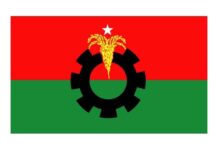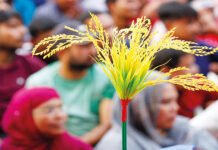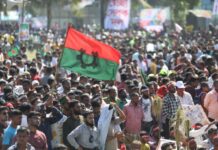Politics Gone Missing

Politics have gone missing from Bangladesh. This may sound naïve, considering that the country had a national election less than two months ago and several elections are upcoming. The election for the mayor of a part of the capital city is only a few days away, elections to the Upazila councils—staggered over a few phases—begins in March, and the historic Ducsu election will be held after 28 years on March 11.
As for the parliamentary election held on December 30, 2018, despite the fact that all political parties participated in it, it was anything but participatory on the part of the voters. Notwithstanding the persecution of the opposition, the absence of a level playing field, and thousands of “ghost” cases filed against innocent citizens, the defining feature of that election was the blurring of lines among the state, the government, and the ruling party. As Professor MM Akash has recently said, “If the DCs (deputy commissioners) and the SPs (superintendents of police) had not helped the Awami League, it would not have been able to win the election.” (The Daily Star, February 18) In a similar vein, a faction of the JSD concluded that “an over-enthusiastic section of the administration stuffed the ballot boxes with fake votes on the night before the polling day and indulged in many related irregularities.” Although this was not a revelation to those who were in Bangladesh on the Election Day or followed the election closely, it was a reaffirmation of sorts. The so-called “overenthusiasm” of the administration and police had driven out politics from the electoral arena and put the members of the administration and law enforcement agencies in the driver’s seat.
One reason for the lack of interest about the upcoming elections at the Upazila level is the absence of the major opposition parties. Their decision to boycott has been prompted by the experience of the recent national election and the elections of the city corporations. But it is not only the opposition which is missing here, but also the public confidence in the Election Commission’s ability to hold a fair election. Did the 2018 national election shatter the citizens’ faith in the electoral system? If that was the objective of the entire machination, it is succeeding. The gradual dismantling of institutions like the electoral system is the way to depoliticise a society.
It is in this context that the Ducsu election is expected to assume greater significance. Of course, the Ducsu election, on all the previous occasions, had attracted national attention as it served as a barometer of national politics. The fact that the ruling party’s student wing never succeeded in winning the Ducsu election is telling in this regard. But increasingly, it appears that March 11 will be a mere replication of all recent elections. The students’ demand to have the polling centres placed in academic buildings, instead of the student halls, has been rejected by the university administration citing the Ducsu constitution. Doesn’t the constitution also stipulate an election every year? While the administration conveniently flouted this provision for the past 28 years, it is now clinging to another provision to nullify the legitimate concerns of almost all student organisations. Evidently, having polling centres at the halls will not be conducive to the participation of the students at large. The university administration seems to be pretending that it is unaware of the fact that these halls have been under the absolute control of Bangladesh Chhatra League (BCL), the student wing of the ruling party, for almost a decade.
These provide an impression that the Election Commission and the Dhaka University authorities are more inclined to have an electoral exercise devoid of the spirit of politics. It is interesting to see that the presence of the student wing of BNP, Jatiyatabadi Chhatra Dal (JCD), on campus, particularly at the Madhur Canteen, after nine years has made headlines. Several newspapers reported how many hours JCD leaders spent at the Madhur Canteen on a particular day. Understandably, the oddity element has prompted the media to cover the news. But wasn’t Madhur Canteen supposed to be the “home” of student activists? The quota reform activists who plan to contest in the Ducsu election have faced and continue to face the wrath of the ruling party’s student activists. With the deadline for collecting nomination papers ending today, there is no sign of an environment in which different organisations can coexist without fear.
These elections, however, are not only signs of the absence of politics; there are others too. The Jatiya Oikya Front had a hard time finding a venue to hold a public hearing on the national election. The JOF alleged that they couldn’t get an auditorium for the purpose because “they [the government] have asked the authorities of different institutions not to allow us to hold our programme,” said a JOF leader. How can one explain that an alliance that participated in the election is not being allowed to hold a gathering to hear the experiences of its candidates? Even the military regimes allowed “indoor politics”.
These pale in comparison to some of the actions of the new government. Take, for example, the appointment of Shajahan Khan as the head of an advisory committee on road safety. Khan’s smirk after the death of two students in an accident sparked outrage last year. Besides, on previous occasions, Khan had undermined government efforts to bring discipline to the road transport sector. Any consideration of political repercussions would have precluded the government from taking such a step. It is not only a slap in the face of those student demonstrators who demanded road safety, but also all the citizens—the message is loud and clear: you don’t matter. Similarly, Abdur Rahman Bodi, widely known as a “godfather” of yaba trading, was given the responsibility to coordinate the surrender of the yaba traders. Merely calling these developments “ironic” fails to explain them. The sheer number of made-up cases, generally referred to as “ghost cases”, filed against innocent citizens before the election and the utter disregard for their plight as they are dragged through the judicial system are another example that politics, support and sympathy of the citizens have no value.
Politics, above all, is about the citizens’ right to speak freely, without fear. The freedom of expression, enshrined in the Constitution of the country, has now become elusive. The Digital Security Act is hanging over the head like the Sword of Damocles. On the one hand, the mainstream media are either domesticated or exercising “self-censorship”; on the other hand, the cyberspace is surveilled to the extent that one can be victimised for trifling matters. The whispering voices are the only ones left. But for how long is the question.
Ali Riaz is a distinguished professor of political science at the Illinois State University, USA.









